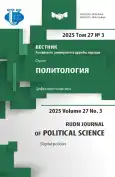The Value Bases of Digital Political Participation of Modern Russian Youth: Results of Empirical Research
- Authors: Lagutin O.V.1,2, Shentyakova A.V.1,2
-
Affiliations:
- Saint Petersburg State University
- Federal Center of Theoretical and Applied Sociology of the Russian Academy of Sciences
- Issue: Vol 27, No 3 (2025): Digital policies
- Pages: 673-691
- Section: DIGITAL TRANSFORMATION
- URL: https://journal-vniispk.ru/2313-1438/article/view/348843
- DOI: https://doi.org/10.22363/2313-1438-2025-27-3-673-691
- EDN: https://elibrary.ru/RSBNGC
- ID: 348843
Cite item
Full Text
Abstract
Modern megalopolises are special socio-economic agglomerations in which the quality of life, comfortable urban environment, infrastructure development, high level of information technology and Internet accessibility create an attractive image of the territories for the younger generation. The conditions of communication and socialization of the urban environment in a modern megalopolis are determined by the high level of digitalization, speed and volume of information flows. All these factors influence the value orientations and political preferences of young citizens. The influence of digitalization on the formation of political norms, values and forms of political participation among the younger generation determines the relevance of the study. The purpose of the study is to identify the relationship between the value preferences of young people, the degree of inclusion in network communications and digital forms of political participation. The methodological basis of the study was the value concepts of R. Inglehart, M. Rokeach, the theory of civic culture of G.A. Almond and S. Verba, the theory of value schisms of S.M. Lipset - S. Rokkan. The empirical basis of the study was the results of an online survey of young people in large cities of the Russian Federation. Multivariate analysis methods allowed us to identify the connection between the model of political participation using digital technologies and the types of value orientations of urban youth. The results of the cluster analysis revealed two politically active groups that have different ideological and value vectors of activity. The basis for the divisions between the two segments is the axis with individualistic and collectivist poles, which are combined with liberal and conservative value priorities.
About the authors
Oleg V. Lagutin
Saint Petersburg State University; Federal Center of Theoretical and Applied Sociology of the Russian Academy of Sciences
Author for correspondence.
Email: o.lagutin@spbu.ru
ORCID iD: 0000-0001-8746-7217
PhD in Political Science, Associate Professor of the Department of Political Institutions and Applied Political Studies
Saint Petersburg, Russian FederationAnna V. Shentyakova
Saint Petersburg State University; Federal Center of Theoretical and Applied Sociology of the Russian Academy of Sciences
Email: a.shentyakova@spbu.ru
ORCID iD: 0000-0002-2389-8162
PhD in Political Science, Senior Lecturer of the Department of Political Institutions and Applied Political Studies, Saint-P etersburg State University. Associate Research Fellow, Sociological Institute of the RAS - Branch of the Federal Center of Theoretical and Applied Sociology of the Russian Academy of Sciences
Saint Petersburg, Russian FederationReferences
- Abramson, P.R. (2014). Value Change over a Third of a Century. The Evidence for Generational Replacement. In R.J. Dalton & Welzel, Ch. (Eds.), The Civic Culture Transformed: From Allegiant to Assertive Citizenship (pp. 19–34). New York: Cambrigde University Press.
- Almond, G.A., & Verba, S. (2010). Civic Culture. An Approach to the Study of Political Culture. Politeia, 2, 122–144. (In Russian). https://doi.org/10.30570/2078-5089-2010-57-2-122-144
- Artemov, G.P., & Pinkevich, A.G. (2018). The experience of studying the relationship between value conflicts and social tension on the base of the World Values Survey data. Vestnik of Saint Petersburg University. Philosophy and Conflict Studies, 34(2), 251–263. (In Russian). https://doi.org/ 10.21638/11701/spbu17.2018.209.
- Baranov, N.A. (2020). Digital political participation as a form political mobilization. The Caspian Region: Politics, Economics, Culture, 3, 66–72. (In Russian.). https://doi.org/10.21672/1818-510X-2020-64-3-066-072
- Inglehart, R. (1997). Postmodemity: Changing Values and Changing Societies. Polis. Political Studies, (4), 6–23. (In Russian). EDN:ESCOIL.
- Lagutin, O.V. (2021). Models of online mobilization of political protest of modern Russian youth (results of an empirical study). Konfliktologia, 16(1), 13–17. (In Russian). https://doi.org/10.31312/2310-6085-2021-16-1-9-20
- Lipset, S.M., & Rokkan, S. (1967). Cleavage structures, party systems and voter alignments: An introduction. In Lipset, S.M., & S. Rokkan. Party Systems and Voter Alignments: Cross- national Perspectives (pp. 1–64). New York: Free Press
- Mikhaylova, V.V. (2018). New Information and Communication Technologies as a Factor in Increasing the Youth Political Participation. Administrative Consulting, (10), 169–175. (In Russian). https://doi.org/10.22394/1726-1139-2018-10-169-175
- Okunev, I.Yu. (2022). Cyclicity of ideological and political cleavages in the electoral space: Towards a new reading of the Lipset-Rokkan concept. Bulletin of Perm University. Political Science, 16(3), 52–62. (In Russian). https://doi.org/10.17072/2218-1067-2022-3-52-62
- Pfetser, S.A. (2013). Theoretical and Methodological Bases of Analyzing the Problem of Political Participation. SibScript, 1(3), 103–110. (In Russian).
- Rokkan, S. (1970). Citizens, Elections, Parties: Approaches to the Comparative Study of the Processes of Development. Oslo: Universitetsførlaget.
- Ryndina, A.S. (2021). Large-scale values research: opportunities and limitations. Theory and Practice of Social Development, 6, 63–69. (In Russian). https://doi.org/10.24158/tipor.2021.6.9
- Shevchenko, L.V. (2022). Transformation of Socio-Political Communication in the Context of the Digitalization of Society. Humanities of the South of Russia, 11(6), 191–200. (In Russian.). https://doi.org/10.18522/2227-8656.2022.6.11 EDN DKAJFW.
- Van Deth, J.W. (2014). A Conceptual Map of Political Participation. Acta Politica, 49, 349–367. https://doi.org/10.1057/ap.2014.6
Supplementary files









